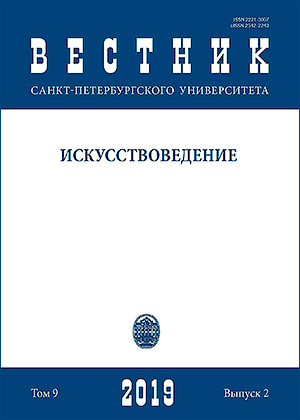Harrison Birtwistle’s “Orpheus-Project”: Images of Melancholy
DOI:
https://doi.org/10.21638/spbu15.2019.203Аннотация
British composer Harrison Birtwistle (b. 1934) is considered to be one of the most striking figures of contemporary classical music. The most important idea which crosses many of his pieces is the multiple embodiment of the Orpheus myth. Orpheus is interpreted not only as a person with his own tragedy, but also becomes an umbrella phenomenon embracing his mythic brother Linos, his wife Euridice, and different aspects of the voyage to the Underworld: wandering in the kingdom of Hades, conducting a dialog with the King of the Dead, as well as various-level reflections on the whole myth (allegoric, metaphoric, symbolic). Embodying all these aspects, the composer takes a wide range of texts (from Ausonius and Boethius, to Christopher Logue and Sir Thomas Wyatt, to Rainer Maria Rilke and Peter Zinoviev) and produces a number of works of different genres: instrumental pieces (Linoi), cantatas (The Death of Orpheus, Meridian), choral compositions (Fields of Sorrow, On the Threshold of the Night), operas (The Mask of Orpheus, The Corridor), and song cycles (Orpheus Elegies). Thus, Birtwistle’s reflections on Orpheus form a series of works that display the whole range of images and situations contained in the myth, taken from different angles that can be compared to Picasso’s famous series of reinterpretations of Las Meninas. One feature common to all these compositions is:that they are emotionally charged with a deep melancholy characteristic of a composer who recognizes in himself this kind of temperament as his peculiarity, and inspired by his famous predecessor, Dürer and Dowland.
Ключевые слова:
Harrison Birtwistle, Orpheus myth, series of works, Zinoviev, Rilke, Ausonius, Boethius, melancholy as an emotional modus
Скачивания
Библиографические ссылки
Music Editions
Загрузки
Опубликован
Как цитировать
Выпуск
Раздел
Лицензия
Статьи журнала «Вестник Санкт-Петербургского университета. Искусствоведение» находятся в открытом доступе и распространяются в соответствии с условиями Лицензионного Договора с Санкт-Петербургским государственным университетом, который бесплатно предоставляет авторам неограниченное распространение и самостоятельное архивирование.







